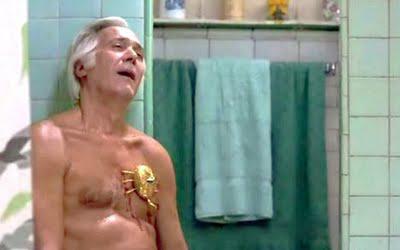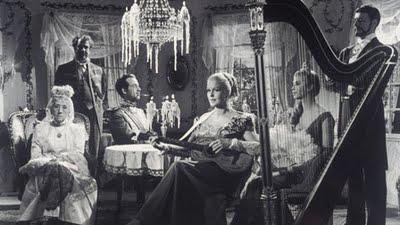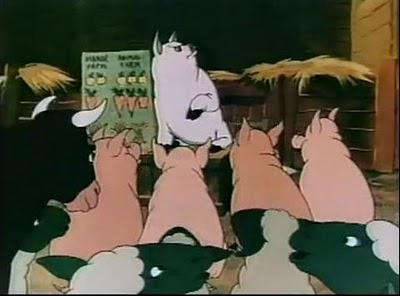
Admittedly more of a primer for Guillermo Del Toro's career to come than a great work in its own right, Cronos is nevertheless a delightfully wicked and kooky spookfest that introduces recurring objects (bugs, gears), actors (Ron Perlman, Federico Luppi) and themes (fantasy's co-mingling with the real and not-as-concrete-as-it-seems in such a way as to expose humans as both the purest heroes and most terrible monsters) in an original vampire story. Intriguingly, Del Toro uses an aged lead and does not transform him into a younger man, instead showing the device that gives cursed immortality to its users only marginally turning back the clock, further demonstrating the futility of this dark quest for eternal life. The film boasts some wonderfully macabre moments, especially an autopsy of the undead man, who revives before cremation with his mouth sewn shut. The scene is all the more darkly funny for the issues the undertaker has with the crematorium's gas line. Perlman steals the film as the put-upon nephew tasked with finding the alchemical device for his loathed, dying uncle, a performance that is as petulant as it is sneering an brutish. Del Toro's camerawork isn't as hauntingly elegant as it would later be, yet his inventive manipulation of existing sets into fantastical sub-realms presages his later gift for grandiose set design. An embryonic work, perhaps, but when you're watching the birth of a filmmaker as good as Del Toro, there's plenty to please the viewer. Grade: B-
Smiles of a Summer Night (Ingmar Bergman, 1955)

Bergman's breakthrough hit is a light comedy that initially seems so unlike the director's later experiments in spiritual vacuums. But even its tone of jaunty, theatrical aestheticism (aided greatly by Gunnar Fischer's trademark cinematography of cinematically skewed stage framings) reveals the darker impulses within Bergman, who makes farce of the psychological mire of a love triangle between a father, his son and the lad's stepmother even after the pressure bursts the dynamic and spills into other characters. Yet if this is a sex farce, it must surely be the most lyric and graceful one ever put to film. The men deal with confusion, insecurity and and hormones they cannot control, while the women's hushed plotting is less misogynistic scheming than a show of their dark amusement at the follies of men and their attempts to, as ever, sort everything out for their hapless lovers. The mixture of Wildean wit and Bergman's despair works magnificently, and lines like "How can a woman ever love a man?" imbue the mired sexual relationships with an overarching poetry. And only someone capable of such bottomless depression as Bergman could spin a positive, warm ending out of a climax of Russian roulette. Grade: A
(P.S. Criterion's new Blu-Ray is one of their best transfers this year along with Pale Flower.)
Animal Farm (John Halas and Joy Bachelor, 1954)

More noteworthy today as the first released British animated feature than as a great work, John Halas and Joy Bachelor's Animal Farm is a dated work but not particularly a failure. It's most telling flaw is its substitution of the melancholy of Orwell's book, which realized the folly of Communism with regret for its impossibility, with a more propagandic sense of victory over the authoritarians who seize control of the supposedly egalitarian society. (It is now believed that the CIA itself funded the film as a piece of anti-Commie propaganda.) That robs the work of a great deal of its power and the satire of its bitterness, leaving a film that, to use the old saying, knows the steps but not the rhythm. And while I understand that the budget for any British production will not compare to the Hollywood or Disney machines, but the lack of visual dynamism holds back the film. It would have been clever to show a transition from a utopia to an autocratic nightmare, but instead the narrative moves through a flat, unchanging background. Nevertheless, the animation of the animals themselves is a briefly redeeming flash of light, allowing them more sophisticated movements while still maintaining their proper forms, only fully anthropomorphizing the pigs for thematic purposes. Grade:C-

